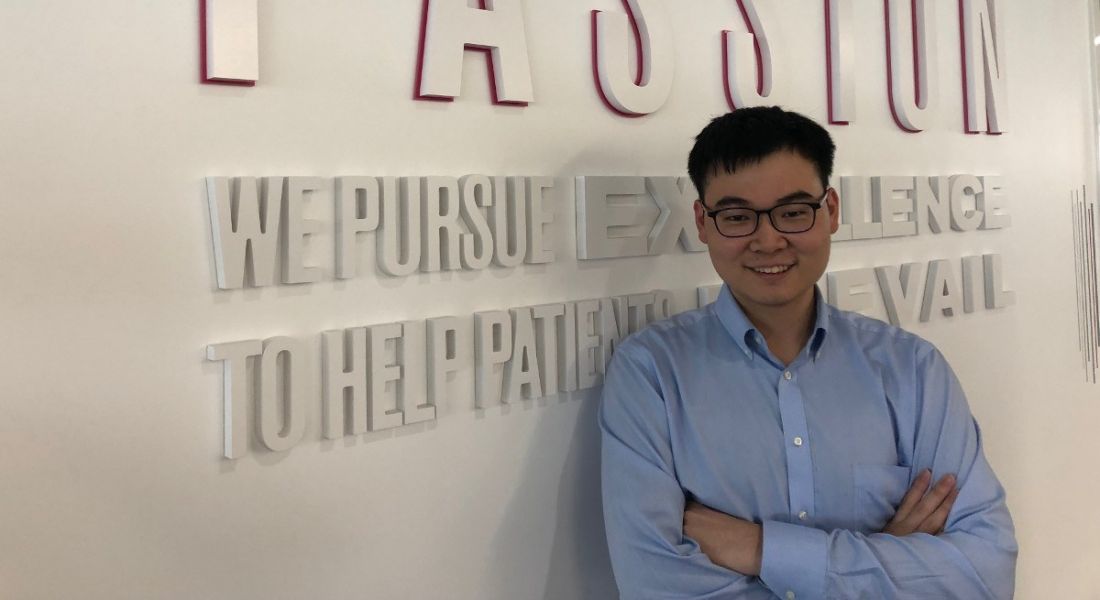There are a number of skills that will serve you well when you start an internship, but patience is especially key in the life sciences field.
Internships are a vital element to kick-starting your career. They allow students to put the skills they have gained into practice and to gain some insight into what a career in their chosen field will be like.
There are a number of skills that can help massively during this time. Yet for Linus Sng, an international student studying chemical and bioprocessing engineering at University College Dublin, patience was the skill that was especially important during his internship with BMS.
We caught up with Sng to see how he fared during his time with the life sciences giant.
What are you studying in college?
I am an international student currently pursuing a chemical and bioprocess engineering degree in University College Dublin. I joined the manufacturing engineering team in Bristol-Myers Squibb (BMS) for a 14-week summer placement in June after finishing my third year of college.
What drew you to BMS when you were seeking an internship?
One of my lecturers is from the National Institute for Bioprocessing Research and Training (NIBRT) and he taught us how the biopharmaceutical industry is changing in Ireland and across the world. He told us how BMS had just invested $1bn in Ireland on their new biologics manufacturing plant.
My interest in the biopharma sector grew and, two-and-a-half years later, BMS advertised for a summer internship. I thought, this is a perfect way for me to gain experience in this field and my first step towards my chemical engineering career. I applied for it and I am glad I got it.
What expectations did you have before you began your internship?
I heard great things about the internship programme from a former intern. I pictured myself shadowing a colleague testing and running phases on a system, helping with engineering paperwork for the team and working on ad-hoc tasks.
What duties and responsibilities were you given initially?
On the first day of placement, interns were given a student internship integration plan by their managers. The plan included a list of projects that I would be tasked with during my placement.
I was given simple projects for a few weeks to get myself familiar with some of the basic processes used on site, like the clean-in-place (CIP) process running in the plant. The CIP process is basically a cleaning process of the system after a manufacturing batch is finished.
I also had the opportunity to go on tours to the different buildings, see the facilities and meet the different departments. This helped me to understand the complete production process and how each department is working together to achieve the same goal.
Did the scope of your work change as the internship progressed?
For the remaining period of my placement, I was given a project to complete. The project involved simulating the systems running on the manufacturing floor with a created virtual graphic on an existing web application. It was a highly detailed graphic of the system in progress, which allows my colleagues to observe the system working with real-time data, meaning they do not need to enter the manufacturing floor.
As my placement progressed, my manager gave me an opportunity to work on a new project, the time-modelling project, as it tied in well with my other project. This was a great opportunity for me as I was able to gain more experience with different systems than what was initially planned.
Can you describe a typical day in your role?
My role varied from day to day. On a normal day, I normally meet with my colleagues and get their feedback on my project and how it may be improved. Generally, the feedback given on the projects are suggestions on how to increase user experience by improving the virtual graphics, adding on more features for easy accessibility and simple visualisation.
When the manufacturing floor is busy, I shadow my colleagues and observe the processes of the runs, reviewing the parameters and taking notes on problems occurred.
What key things have you learned during this internship?
During this internship, your brain is like a sponge absorbing all the knowledge from people around you. There are so many things going on and you try your best to learn everything from everyone. I found during my time in BMS that the key thing to getting work done is through communication and time management.
Another trait that I learned is important while working in a start-up manufacturing facility is patience. Sometimes, it can take a lot of time and effort to finish a task and you may face some obstacles along the way. It is important to learn from any hurdles you face as they will help you become a better engineer.
Has this internship made you feel as though you’re on the right career path?
My internship in BMS offered me a glimpse on what the career path for an engineer in a biopharmaceutical company holds. Now, I am more than happy to go back to college, complete my degree and come right back again to get started with my career. I think I had doubts before I started the chemical engineering degree and was struggling to choose what engineering discipline I wanted to take. Now, I know I made the right choice.
Do you feel more prepared for working life following your internship? Please give details.
Absolutely. Before this internship, I was really nervous about going to work in a biopharmaceutical plant because of its sophisticated processes and how regulated it is as they produce medicines.
This placement has been a great opportunity and has given me great insight on what the industry has to offer, and this experience made me feel more prepared to work after college.
Why should someone take up an internship at BMS?
BMS Cruiserath has a great working culture. Everyone here is very passionate about what they are doing – working to help the patients – and I believe this is what makes the working environment really vibrant.
Managers and employees blend together really well and help each other out if needed. I think this is what teamwork at its best looks like.
Even though you are a student in the company, the amount of responsibilities entrusted on you is phenomenal. You get the opportunity to showcase your qualities and develop your skillsets in the projects given. If you have ideas or want to work on a new project, your voice and feedback is heard by your managers.




